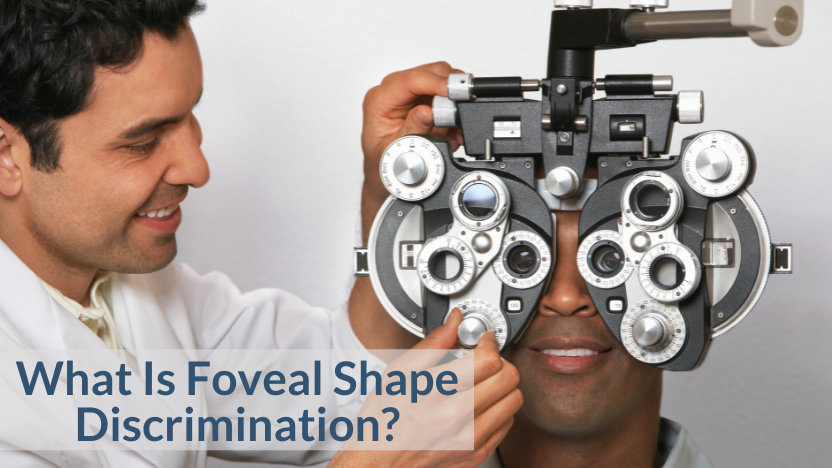What Is Foveal Shape Discrimination?
Posted by amess on Sep 9th 2021
When it comes to vision, there are many terms that we are not initially familiar with. However, if you or someone you know may have age-related eye health issues, you may have heard of foveal shape discrimination. Even if you have heard of this term, it’s difficult to fully understand what it means and why it matters for your vision. Here’s what you need to know.

Foveal Shape Discrimination: What Is It?
Foveal shape discrimination defines the eye’s ability to distinguish various shaped targets from one another. It’s the capability to determine the misalignment of an object relevant to other objects in the same space. It can be measured under various lighting conditions to account for different times of day. It can also be measured by showing shapes with various sharp and blurry lines on a monitor.
Why Does Foveal Shape Discrimination Matter?
Most visual function terms matter to everyone. However, this term is particularly important for those who have or are at risk for age-related eye health issues. When age-related eye health issues worsen, there is build up in your eye that can distort your vision, causing straight lines to look wavy. This visual distortion causes daily tasks to become difficult such as cutting food, writing, and driving. When your foveal shape discrimination is bad enough, it can even threaten your independence.

 Amsler Grid
Amsler Grid
An Amsler grid is an at-home test to ensure your vision isn’t becoming distorted. Eye doctors often give these to patients who are identified with age-related eye health issues so they can track their vision. If there is any decline, this grid can help them recognize it quickly.
How Can I Improve Foveal Shape Discrimination?
As mentioned, foveal shape discrimination is affected by the buildup that occurs in the eyes due to age-related eye health issues. As of now, there is no cure for these issues. However, nutrition has been shown to have a positive impact on eye health and visual function. Specifically, an antioxidant called zeaxanthin has been demonstrated to improve foveal shape discrimination, but only when ingested in high amounts (8+ mg).
Supplementation
Zeaxanthin is found in brightly colored fruits and vegetables, but you’d need to eat 20 ears of corn a day to get the amount of zeaxanthin your eyes need to stay healthy. That’s why many eye doctors recommend supplementation. EyePromise eye vitamins are crafted and trusted by doctors across the country and includes a line of clinically proven formulas for age-related eye health issues.
EyePromise Restore is our flagship product and designed for those who are at risk for or with early signs of age-related eye health issues.
EyePromise Macular Health Complete is an AREDS 2-based formula with added ingredients like extra zeaxanthin, Vitamin D, and Omega-3s, delivering all the nutrients your eyes need to maintain healthy vision.
EyePromise Macular Health is another AREDS 2-based formula but with no zinc. With genetic testing, health professionals can determine if certain individuals need to avoid this mineral due to potentially harmful side effects. Macular Health allows these types of people to still support their eye health.
Not sure if these products are right for you? Take our product selector quiz! Don’t forget to schedule your annual eye exam to ensure you catch any vision issues before they affect your eyes!


